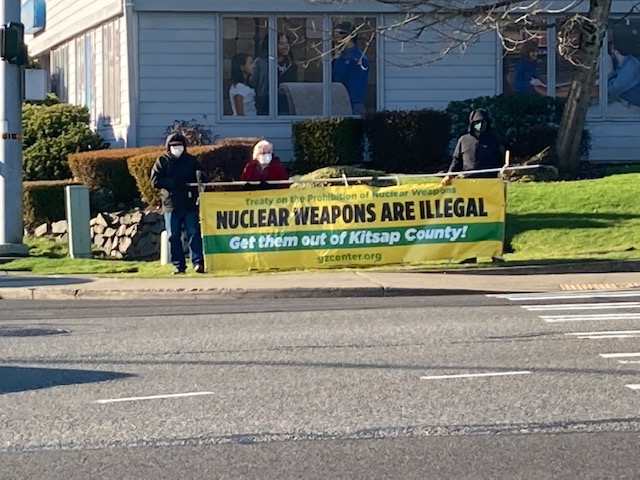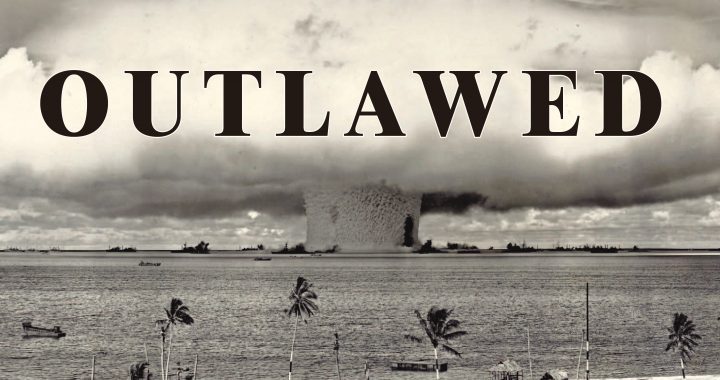Editor’s Note: This post is an edited and expanded version of a Paid Public Service Announcement, written by Ground Zero’s Glen Milner, run in the Kitsap Sun newspaper on January 16, 2022.
The Treaty on the Prohibition of Nuclear Weapons (TPNW) is the first legally binding international agreement to comprehensively prohibit nuclear weapons with the ultimate goal being their total elimination. It was adopted on July 7,2017, opened for signature on September 20, 2017, and entered into force on January 22, 2021.
The (TPNW) outlaws not only the use of nuclear weapons, but everything to do with nuclear weapons, making it illegal under international law for participating countries to “develop, test, produce, manufacture, otherwise acquire, possess, or stockpile nuclear weapons or other nuclear explosive devices.”
As of December 2021, 59 states have ratified or acceded to the treaty, most recently Peru in December 2021.. The first meeting of State Parties to the TPNW will take place at the United Nations in Vienna, March 22-24, 2022. None of the nuclear weapons states have signed the treaty.
While the treaty’s prohibitions are legally binding only in the countries that become States Parties to the treaty, those prohibitions go beyond just the activities of governments. Article 1(e) of the treaty prohibits States Parties from assisting “anyone” engaged in any of those prohibited activities, including private companies and individuals who may be involved in the nuclear weapons business.

Ground Zero members vigiling outside the Kitsap Mall in Silverdale, Washington, on January 22nd, the anniversary of the entry into force of the TPNW.
And while it is almost unknown in the U.S., a nuclear divestment campaign is already happening because of the treaty.
The second-largest pension fund on Earth, in Norway, has sold its investments in companies that produce nuclear weapons. ABP in the Netherlands, the world’s fifth-largest pension fund, has done likewise. An ABP executive explained why: “Changes in society, also at an international level, [mean that] nuclear weapons no longer fit in with our sustainable and responsible investment policy.”
Nuclear weapons still exist largely because the companies involved in the business wield such enormous power over government policies and decision-making. They are among the largest donors to congressional re-election campaigns and spend millions of dollars on lobbying in Washington, D.C.
U.S. policy towards nuclear weapons will change when those companies involved with nuclear weapons start to feel real pressure from the TPNW and realize that their own futures depend on diversifying their activities away from nuclear weapons.
Naval Base Kitsap-Bangor is located a few miles from the cities of Silverdale and Poulsbo and is homeport to the largest concentration of deployed nuclear weapons in the U.S. The nuclear warheads are deployed on Trident D-5 missiles on SSBN submarines and are stored in an underground nuclear weapons storage facility on the base.
Our proximity to the largest number of deployed nuclear weapons demands a deeper reflection and response to the threat of nuclear war.
The Treaty on the Prohibition of Nuclear Weapons gains importance at a critical time—while enormous resources are being poured into nuclear weapons “modernization” and with the growing risk of nuclear war. The TPNW is a significant tool for nuclear disarmament, providing a path for the future and a cause for celebration today.
Ground Zero Center for Nonviolent Action – located next to the Bangor Trident base – is active in the movement to abolish nuclear weapons and, as part of that goal, works to build awareness of the importance of the TPNW. This is a critical time as the nuclear armed nations, led by the United States and Russia, continue to place undue (and a foolish) reliance on nuclear weapons as tools of foreign policy. Sooner or later, so long as nuclear weapons exist, and are deployed, ready to launch on warning, it is not a matter of if, but when a catastrophic nuclear war will occur, either by accident of intention.




